- Home
- Lionel Shriver
Checker and the Derailleurs Page 2
Checker and the Derailleurs Read online
Page 2
Furthermore, Eaton was underage, and though he usually cooled his way past the bouncer by paying the cover with an unusually large bill, Eaton craved legitimation. He hated being nineteen. He remembered with humiliation the other night at Van Dam’s, when the thirtyish man beside him had asked him, as a drummer, what did he think of “In-A-Gadda-Da-Vida”?
“Amusing, but finally bogus. I didn’t go along with the brouhaha over the album when it first came out.”
“Come on!” said the man. “It came out in ’68! You were listening to Iron Butterfly when you were one?”
Eaton couldn’t wait to turn thirty and do the same thing to kids sitting next to him. In the meantime, he listened to the radio with a pencil, and haunted the aisles of Tower Records like a law student in the stacks, studying jackets like torts, reading the fine print—dates, producers. He put together histories of who left what band and started this one, reading Rolling Stone cover to cover, determined never to be caught out by aging rock has-beens in Manhattan again.
Eaton yearned for a club where patrons knocked him on the shoulder and cleared room for him at the bar, where the waitresses knew him by name and remembered his liquor brands. Eaton liked to be recognized, and Astoria should have been the place for that; a small-towny Greek neighborhood in Queens with friendly shopkeepers and good-old-boy bars, Astoria would transplant easily to the middle of Iowa. Eaton’s failure to carve a niche even here was one more of those disconcerting challenges to his stature, for if he went to the same bar several nights running, Eaton would sure enough get recognized, but no one seemed very happy to see him.
Besides, everyone said Plato’s was “good,” though the word had put Eaton off distinctly. They said it the way you’d say a “good woman,” meaning ugly. Plato’s was a “good club” the way you’d say Jerusalem was good, somewhere in the Bible.
The following Friday night Eaton kept putting on his coat and taking it off again. He’d flounce in a chair, tap his fingers, turn up the radio—Journey. Awful. Off. Tap, tap, tap. Finally, he grabbed the cashmere once and for all and rushed out the door.
Gliding in with his crew, Eaton glanced hastily around the club; when he failed to find what he was looking for, his stomach sank, just as it had when Charlotte showed up at his gigs without Stephanie. The place suddenly felt flat. This time, Eaton wondered why he’d concerned himself with Plato’s at all—low-lit and woody, with no track lighting or rippling bulbs around the bar, the club made no effort at any kind of effect. Furthermore, at almost midnight, there was no music. Maybe The Derailleurs were on a break, but if so they couldn’t have bubbled anybody’s hormones—the immediate feeling of the crowd was subdued, even depressed. No one was talking very loud, and everyone seemed sober.
“This place is sure different from last time,” said Brinkley.
“This isn’t a club, it’s a morgue!” said Gilbert.
They sat in the corner, refreshingly disgusted.
“I thought there was supposed to be live music here,” Eaton charged the waitress.
She sighed. “Well, it’s happened again. You know. Check. Maybe next week. Maybe even tomorrow.”
“You lost me.”
She looked at Eaton more closely. “Oh, you’re new here, aren’t you?”
“I have to be a member?”
“No, it’s just regulars are used to this. Checker—disappears.” Raising her eyes enigmatically, she swished her tray to the next table.
That explained it, for the rest of The Derailleurs were all propped at the front table. Breathing in her cloying wake reminded Eaton of passing cosmetics counters, with their nauseating reek of mixed perfumes.
Standing abruptly in the middle of Brinkley and Gilbert’s riveting debate over tequila-salt-lemon vs. tequila-lemon-salt, Eaton swirled his black cashmere greatcoat around his shoulders and strode to the lead guitar.
“Not playing tonight?” Eaton inquired.
“Our head man just won an all-expenses-paid trip to Florida,” said the blond longhair dourly.
“That’s surprising, for a band with your reputation—”
“What have you heard about The Derailleurs?” asked the straight kid, whose ears stuck out from his head.
“We don’t need to hear about The Derailleurs, Howard,” said the longhair. “We are The Derailleurs. We know all about us already.”
“I was wondering,” said Eaton, “since your delinquent member—”
“Nobody said he a delinquent,” said the big black bassist.
“Your man in Florida, then.”
“Our man,” said the bassist firmly, “period.”
Eaton took a breath and smiled. “Of course. It’s just, I’ve kicked around the drums myself. I’m only so good, but if you stuck to covers I could keep a steady three-four. I wouldn’t presume to equal your own stunning percussionist. But for the hell of it, maybe I could fill in?” Eaton looked gamely around the table.
“As the manager—” Howard began.
“Howard listens,” said the guitarist.
“Would he like to listen tonight?” asked Eaton solicitously.
“No.”
They turned toward the end of the table. The Middle Eastern saxophonist had folded his arms. “We half our drummer.”
“On the contrary,” said Eaton, “it seems that you don’t.”
“You say you not so good. Why we play with you, not-so-good?”
“Excuse me, but can he understand me? I see we have some second-language problems here.”
“Rrreal fine, slime mold,” said the saxophonist for himself.
“Aw, can it, Hijack,” said the bassist. “Check on vacation, pull this night out somehow. Let’s play.” Rolling to a stand, he led the rest of the band to the dais.
Eaton took his seat on the throne and pulled his own drumsticks out of his greatcoat. He tested the tom and it went thwap! What? The heads were completely loosened—and no wonder. Calf skins! There wasn’t a rock drummer in this country who used calf skins. With annoyance, Eaton went through the tedious process of racheting the lugs tight and testing around the rim to get them even. Somehow they—resisted. The heads weren’t interested in attaining the tautness Eaton required.
Eaton tried the tuning with a snappy run around the pieces. God, what a pile of tin cans. The hardware rattled. There was a buzz in the bass. And the whole set was ancient, big band or before, though Eaton did admire the Zildjian-K’s—you hardly ever saw those nowadays, hand-hammered Armenian cymbals, exquisitely thin. Even the ride rang with a long resonant shimmer at the touch of his stick, though to Eaton’s taste they were a little oversensitive; they—winced. He eyed the set; it seemed to eye him back. But Eaton knew how to discipline inanimate objects. Whenever his possessions broke, which was often, he imagined he was getting the last laugh.
“Boys and girls, you may have heard we’ve been caught out Checkless,” the lanky guitarist began. “However, with a volunteer from our studio audience, we’ll proceed. In consideration of our guest, only familiar favorites, please.”
When they began with “Louie, Louie,” the whole band had their ears cocked for Eaton’s drumming, though that proved unnecessary—they could barely hear anything else. The guitarist forced his voice; the bassist turned up his level; the keyboardist, something of a delicate touch the weekend before, torqued up his electric piano. When Hijack opened into a sax solo, Eaton bore down all the more, until the horn player was inserting the mic in his bell.
At the end of the song, the saxophonist turned to Eaton behind him. “You break Sheckair’s head,” he said quietly, “I break yours.”
As they grated through Hard Cheese’s “Two Is a Crowd” and on to “Johnny B. Good,” Eaton pushed the tempo when the lead slowed down; he dragged just as the bass thrummed forward. Because drums set the standard, this left the musicians out front sounding out of sync. Further, even when the band was playing together, they all rushed toward the song’s conclusion, as if to end was to win, as if the reason to
play it was to get it over with. And it wasn’t only Eaton, either. They all lashed their instruments, spitting the words out like projectiles they hoped would hit someone on the head. You got the feeling that after listening to a song like that Johnny would be very, very bad.
With “(I Can’t Get No) Satisfaction” Plato’s moist air turned acrid with evaporating sweat. The crowd, though not seemingly disappointed, was unusually rude; one patron in the back kept yelling, “Kill ’em!” waving his hands until he spilled his beer. A fight broke out by the bar; waitresses got testy and started carding; boys got grabby and girls got bitchy; customers recklessly mixed their poisons and threw up in the bathroom. Still, they were all apparently convinced they were having a wonderful time.
When the band took a break, The Derailleurs save the Middle Eastern muttered something to Eaton about “good job,” but their remarks were muffled and short. Everyone but the girl went to swill down something stiff. Eaton felt the victim of a great lack of generosity. He may not have ever experienced genuine, spontaneous acclaim, but he knew this wasn’t it.
When Eaton sat down for the next set the drums glared at him like prison labor.
Eaton outdid himself. The toms tippled in their brackets; the bass edged gradually from his foot; the Zildjian-K’s began to tremble from the shadow of his hand. He broke five hickory drumsticks.
The guitarist suggested they do a slow song and let the girl sing. Rachel DeBruin had a sweet, mournful presence that could surely calm the band down, and maybe the crowd, now growing unruly. The band never had her sing too often, since she made audiences pensive; she recalled lost summers and first loves. On good nights she could raise a napkin to the corner of a biker’s eye. Tonight, however, they would settle for quiet.
Yet when she sang “The Last Time I Saw Richard,” its sweet romantic disappointment bittered; the other musicians harmonized in their heads. Welsher, thought Caldwell, the guitarist. His “friend” J.K. had owed him fifty dollars since July. Strumming next to Caldwell, J.K. felt his bass droop; he’d been lugging mail sacks for the post office all week, and his arms were tired. Two of his friends had left for Jamaica earlier in the week, but J.K. couldn’t go, no—as usual. He had a wife and daughter to support. What a hero, he thought sourly. All day long postcards had spilled from his sacks, of palm trees, greased-up girls, with messages like “Water warm, rum cheap.” The keyboardist, Carl Ming, kept forgetting the chords, but helplessly remembering everything else—fifth grade came at him like a submarine torpedo: four boys, a big brass spatula for a paddle, and a fence. Since his childhood was enough of a torment the first time, “Quiet Carl” wasn’t the nostalgic type; memory itself was assault.
Howard glared from the front table. They thought they were so hot, prancing around on stage. All the errands he ran for those guys, their thanks jokes at his expense. Airheads. Howard recited to himself his very high SAT scores. Meanwhile, the Middle Eastern saxophonist glanced disdainfully down at the audience. Self-satisfied Americans. Rich land, good weather, all those cars, completely wasted on 240 million fat sheep.
In the song, a woman sits in a bar getting drunk, mooning over an old boyfriend; the place is about to close, and the waitress wants her to finish her drink. That’s me, thought Rachel. Twenty years from now, that’s me. Same bar, same man. That bastard. Some days I don’t know what I want more, to slit his throat or mine.
Yet Eaton, insofar as he was capable of the emotion, was perfectly happy.
So there you have The Derailleurs—a motley or tropical crew, depending on your mood. The picture of that obscure Queens rock band, tripping over frayed cords fat with electrician’s tape, could appear credibly striking, but you have to look at them right. Otherwise, especially with indigestion or maybe just an indigenously surly disposition, you might notice how Caldwell is overdrawn, like a cartoon—his nose is enormous, his arms are too long, a vein on his temple protrudes. He jitters around the stage in a panic, constantly adjusting amp settings and checking the jacks, in the grip of some terror, but only nineteen—what is there to be afraid of? Rachel, lost in her big maroon sweater half unraveled down the front, is arguably mousy. She always looks at the floor. Rachel is Bowie’s original China Doll, perched on the edge of the stage—when she shatters you won’t want to be around to pick up the pieces. Someday someone will have to take the blame for Rachel DeBruin. J.K.? One more hunky black kid, likes his beer, his rock and roll—a known quantity. Hijack, whose real name is Rahim Abdul, is too pretty for a boy. And in New York you sure get tired of foreigners. Those accents aren’t quaint or exotic anymore after about week 6 here. From then on, it’s just, I need a cabbage, a small one; Excuse—? A cabbage! Like that. Quiet Carl never says a damn thing, and who needs that. As for Howard Williams, their “manager”? Squid. Boat shoes! Oh, he isn’t exactly ugly—Howard has even, regular American features with nice thick brown American hair—but to whatever degree looks are style, Howard is hideous.
However, it would be possible to execute a little turn like flicking the channel over and back again; the picture, black and white a moment before, blushes to color. Suddenly the spotlight on stage shadows Caldwell’s face with the exotic expressions of a Kabuki mask. He has long, elegant fingers. His hair is bright gold. True, he’s frightened, but at nineteen there’s plenty to be afraid of, like the rest of your life. Rachel is no longer mousy, but delicate. If you circled your thumb and middle finger around her wrist, both end joints would overlap. J.K. is big rather than fat, comfortable and unpretentious as an overstuffed armchair. And so what if Rahim is pretty? Beautiful teeth—matched pearls, a two-string smile. Further, sometimes it’s possible to recuperate that delight in foreigners you had when you first came to New York. His r’s roll like water. Quiet Carl has a story, and you like stories. Howard is handsome, and you’re dying to tell him that. You want to take him shopping and buy him some shirts with color and jeans that don’t hike up like that, Hi-Tops instead of boat shoes. But you won’t. And Howard will keep buying the pale plaids and jeans that are big in the waist and short in the leg, and that makes you smile, because people are astonishingly consistent, so carefully themselves. You don’t mind. Why, he’s the only person you know who wears boat shoes.
What if you added Checker Secretti to this picture? Well, if your mood is sour, Checker isn’t very impressive. Few people seem to notice that he isn’t very tall, but you would notice. His brown skin, kinky hair, and blue eyes would disturb you, for you can’t quite tell what race he is, and it’s stressful when people resist normal categories. You might say he’s “cute,” but he’s no head turner. Not even as straight-out good-looking as, say, Eaton Striker. In fact, you would think this specifically: Not as good-looking as Eaton Striker, since, if you were eyeing Checker Secretti with just this narrow annoyance, you would be Eaton Striker.
But if you feel fine? If you understand that people are attractive not just for their strengths but for their shortcomings? Then how would Checker Secretti look?
You might see the shadow of a nose, the flicker of a hand, a rolled-up sleeve of bright red cotton, but you wouldn’t see the man from head to toe, and it wouldn’t occur to you to wonder whether he was a head turner, because, leaning in the frame of the door, you would have to be Checker Secretti himself.
2 / Blood and Crystal
…and when you finally reappear / at the place where you came in / you’ve thrown your love to all the strangers / and caution to the wind—
“Sheckair!” Rahim stopped cold in the middle of “Love over Gold” and unstrapped his sax to bound from the stage. The rest of the band dribbled off; Eaton was the last to stop playing. Running to the doorway, Rahim clapped Checker’s hand and turned him fully around like a square-dance figure, laughed, and planted a big, unembarrassed kiss on each of Checker’s cheeks.
Between three and five, Plato’s usually settled down to a small core of customers; The Derailleurs would put away their instruments and everyone put his feet up. The drinking slowed to
a trickle, and even diehard rockers grew philosophical. Not tonight. They all pulled on their coats when Check walked forward, slinking out of the club hastily as if leaving the scene of a crime.
“You just get here?” asked Caldwell, fidgeting with his gig bag.
“Caught some of that last set.”
“Yeah, well.” A strap was caught in the zipper, and Caldwell went about solving the problem intently. “Just screwing around. You weren’t here.”
“We’ve been through this.”
“Well, you can’t expect us to be any good,” Caldwell burst out, “without you.”
Checker’s eyes were steady, neutral. “It was interesting.”
“You are toast, man,” said J.K.
“I am a little tired.” Checker turned. “Howard, you arranged a substitute. Good management.”
Howard envied Rahim’s leaping Virginia Reel, but could only swing an awkward, premeditated hug. “You look terrible!”
“Thanks, Howard.”
“No, I mean—”
“You mean I look terrible. Mr. Striker?” Checker pulled a tattered paper from his pocket and read, “Drummer Extraordinaire.”
Eaton felt embarrassed by his own business card, and glared as if the pretentious tag was Checker’s fault. Checker only looked back at him with exposing directness. Eaton felt discovered. Yet when Eaton glanced away and back again, Checker’s expression no longer appeared incisive. There was a deadness or calm in the corners of his blue eyes—blind spots. If Checker were a car, it seems, Eaton Striker would be positioned perfectly behind the right back fender.

 Ordinary Decent Criminals
Ordinary Decent Criminals The Female of the Species
The Female of the Species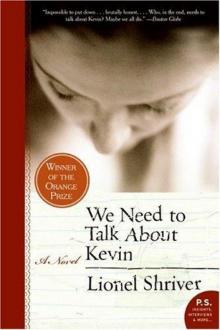 We Need to Talk About Kevin
We Need to Talk About Kevin A Perfectly Good Family
A Perfectly Good Family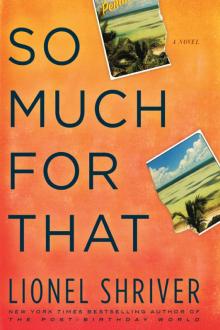 So Much for That
So Much for That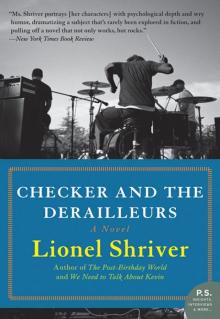 Checker and the Derailleurs
Checker and the Derailleurs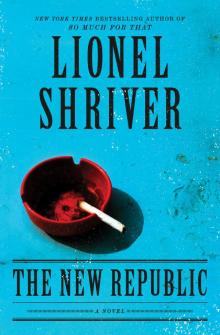 The New Republic
The New Republic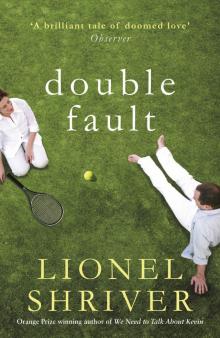 Double Fault
Double Fault Should We Stay or Should We Go
Should We Stay or Should We Go The Post-Birthday World
The Post-Birthday World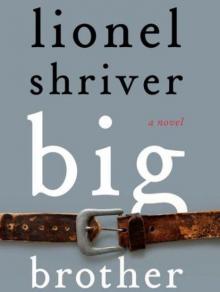 Big Brother
Big Brother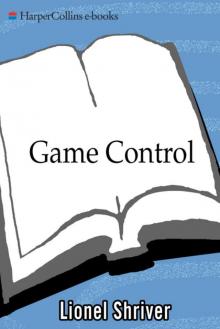 Game Control
Game Control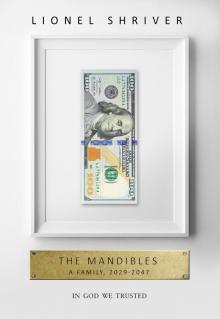 The Mandibles
The Mandibles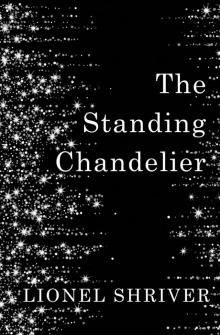 The Standing Chandelier
The Standing Chandelier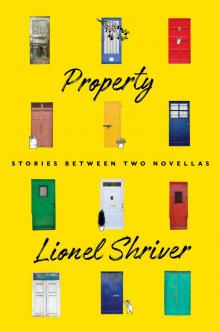 Property
Property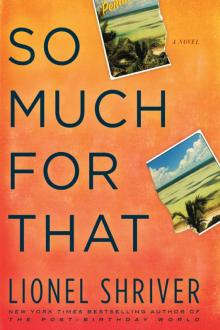 So Much for That: A Novel
So Much for That: A Novel